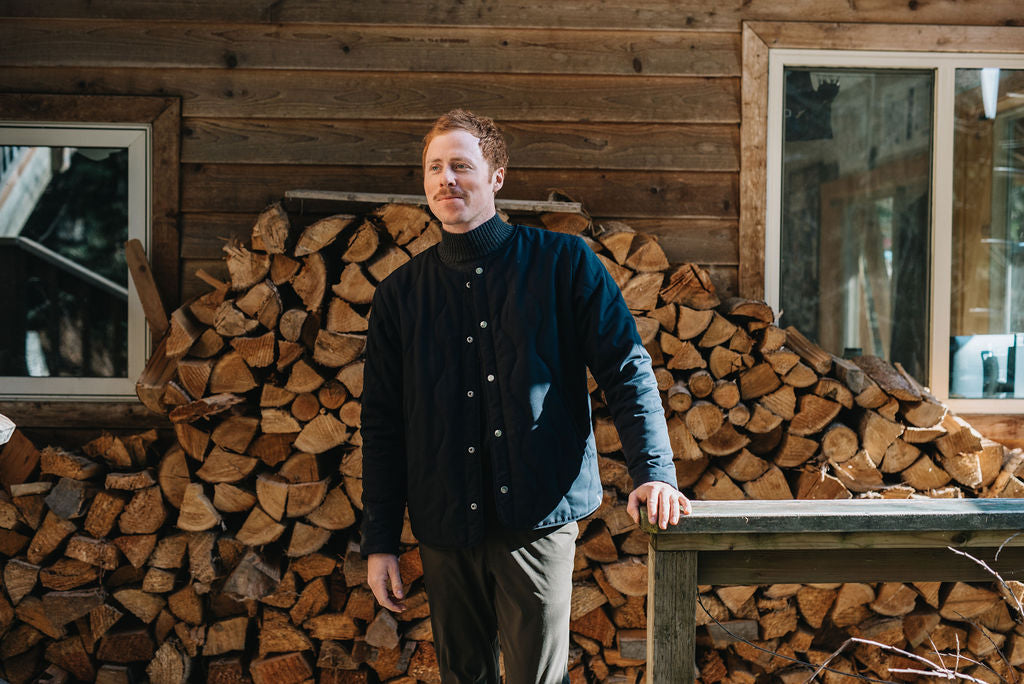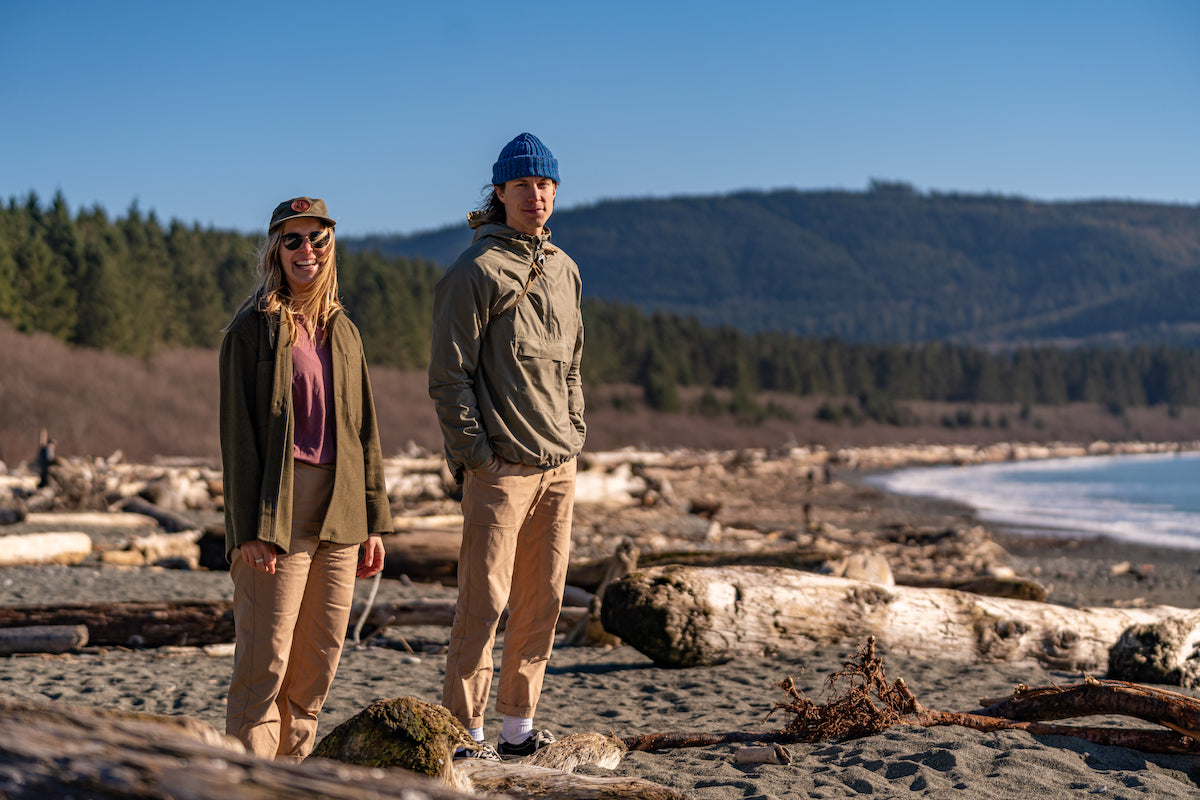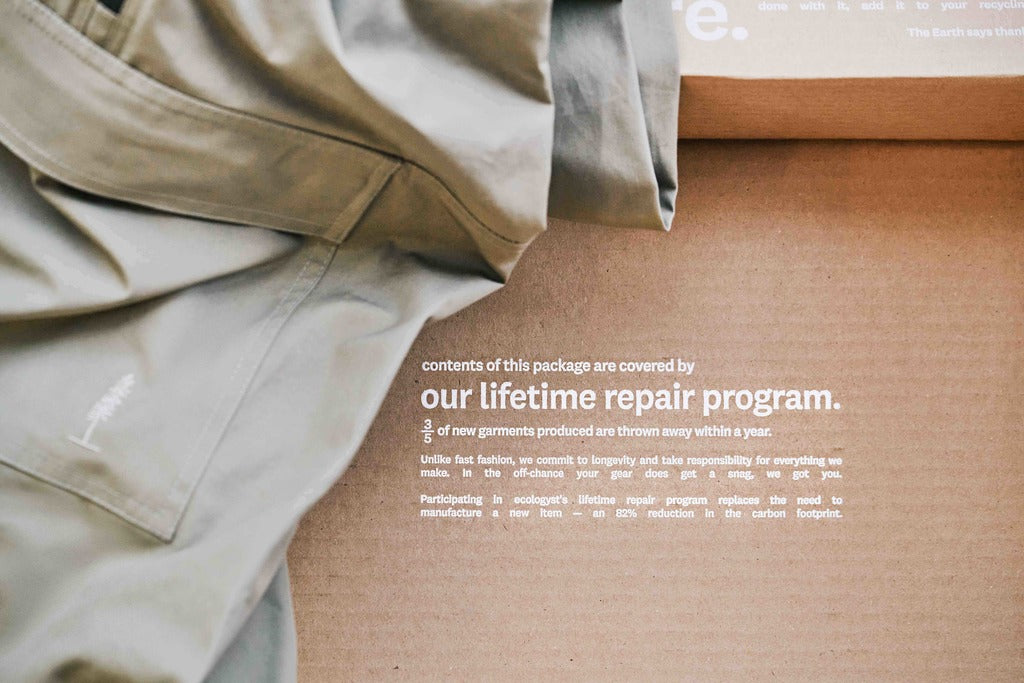Joel Fuller is a filmmaker, photographer, and artist living in Squamish, BC. Joel creates outdoor driven images and films with the intention of authenticity. An active member of the outdoor community, Joel keeps a very mindful balance of both athletic and professional pursuits. Running, ski touring, and cycling get him out of bed outrageously early sometimes, fuelled by peanut butter, bananas, and coffee. Living off-grid has given Joel a unique perspective on what’s most important and impacted his lifestyle choices. We caught up with him to chat about what life is like living off-grid.
ecologyst: Talk about your current residence and what makes it “off-grid”?
Joel: There are a few different communities in the Sea to Sky that are considered off-grid, ie, not being connected to traditional electricity, natural gas lines, or internet etc. Nestled in the forest with the smell of cedar and the sounds of a small creek, the cabin where I live with two close friends was built in the 1970s. Our electricity comes from a micro-hydro system that produces about 815 watts of energy consistently charging four car batteries. To put that into perspective, a hairdryer on high uses about 1500 watts of electricity, so we have to be very mindful of our energy consumption. When these batteries are charged, excess electricity heats our hot water with the security of having a propane water tank as backup. Our sole source of heat in the cabin is a wood-burning fireplace and in the exterior building we use a diesel heater.
e: What was the biggest challenge you faced while transitioning to an off-grid lifestyle?
J: To most people the idea of being off-grid sounds like a dream, but in reality there are some definite sacrifices — albeit enjoyable depending on your mindset. Your only source of heat in the cabin is a fireplace. We spent $1,200 on firewood our first winter because we did not have enough time to process and gather our own. The wood we bought that winter was semi-wet and as many people know, burning wet wood is not at all efficient compared to seasoned (dried) wood. Instead of releasing heat, a lot of the energy is spent evaporating the water in the wood itself, taking more wood and more energy to heat the cabin. In preparation for the second winter, we spent well over 100+ hours gathering and processing firewood. Keeping the fireplace stoked overnight during the winter is something we rarely do since it’s a strain on our supplies, and so, waking up in the morning in a room that is between 2-4 degrees celsius is not uncommon (I’ve got a few good wool blankets, but can often see my own breath).
Additionally, we need to be careful about our energy usage. There isn’t enough electricity to use a drying machine, hot water for laundry, a blow dryer, a heated blanket or an electric heater etc. When I boil water with a kettle each morning to make coffee, the lights dim or flicker from the energy usage. Another challenge has been the lack of good wifi. I know that sounds like a first world problem, but a good internet connection is paramount in today's working world. Before getting Starlink (the Elon Musk wifi), we relied on a dial-up speed satellite provider with a maximum of 100GBs of data per month.That meant I had to drive into cell reception or town every time I had a work call or meeting.
Without a dryer, we’re hyper aware that we live in a temperate rainforest. We’ve learned that drying our clothes in the winter can be a bit difficult. With that said, all of these "difficulties" I've embraced and come to love.

e: What's been the best part?
J: Living in the forest, breathing fresh air, getting that sensation of a rustic mountain lifestyle, processing firewood, using a chainsaw, living with some of my best friends, being surrounded by silence and the sound of flowing water — it’s hard to pinpoint the best parts, but the experience as a whole is unique and something I will never take for granted.
e: How does clothing choice impact your lifestyle?
J: As I’ve become more mindful of the textiles industry and understanding the environmental consequences of fast fashion, I want to buy things and support companies that make quality, good-looking clothes that last and ecologyst absolutely fits the bill. A company that truly cares about the environment and sourcing sustainable materials for their clothing. As a photographer and filmmaker, I gravitate towards simplicity in my work and as a result of that, I strive for simplicity in what I wear. For me, this means buying things that don’t need to be washed very often, like wool garments.

e: From your experiences, what were the easiest shifts to make that other people who live in more "traditional" households can start practicing today to start living more sustainably?
J: That’s a great question, and I’m not sure I have all the answers. I think the idea of off-grid living is beautiful, simple, but often romanticized. Truth be told, I don’t think we have the capacity for everyone to burn wood as a primary heat source, and in the community where I live, we’re the only property that rarely needs to run a gas generator during the winter to charge batteries and supply electricity since most households' supply of water freezes for weeks at a time. That being said, living off-grid has made me appreciate simplicity more — embracing less, appreciating nature, and being mindful of my own impacts. I think anyone that falls in love with nature, trees, and the outdoors naturally becomes more mindful of their impacts and makes mindful choices as a result. I think North Americans including myself can always take a retrospective look and say, “do I really need that?” – as most of us live outside our means.
e: What do you love most about the area you live in?
The limitless opportunity to pursue movement in the outdoors is what I love most. At the same time, I’m very aware that the land we “recreate” on is the traditional lands of the Squamish (Sk̲wx̲wú7mesh) and Lil'wat (L̓il̓wat7úl) peoples. I am constantly inspired by those around me and the wild spaces we can so easily access. These places attract people with similar mindsets, so making meaningful connections with people has been a beautiful journey.
e: How do you like to connect to nature?
I spend a lot of my free time trail running, mountain biking, and ski touring. What all those have in common is movement. I think my favourite way to connect with nature is moving in these wild spaces with other passionate people. Living here, I am constantly reminded to take a deep breath, feel the support of mother nature beneath my feet, and be grateful for it all. Happiness does not come from the things we have, but the authentic experiences we share.
Joel wears the Charcoal Merino Turtleneck in Large, and the Navy Men’s Quilted Wool Liner Jacket in Large. You can follow along on Joel's adventures on his Instagram.
Lush mountain photos by Nathaniel Atakora.



